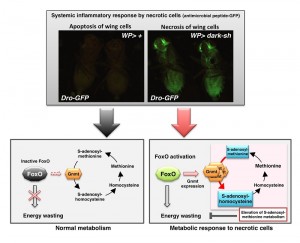The fight against the “dangers inside” Necrosis-driven systemic immune response alters metabolic state

Many unwanted cells are removed by programmed cell death during development and the process of sustaining life. When apoptosis, a kind of programmed cell death, is inhibited, necrotic cell death occurs instead and induces inflammation in surrounding tissues. Studies indicate necrosis is involved in the pathogenesis of various diseases involving inflammation such as cancer, ischemia/reperfusion (loss of blood flow to tissues and damage resulting from its restoration), and arteriosclerosis. However, elucidation of our bodies’ systemic responses to necrotic cells have not been fully elucidated.
Assistant Professor Fumiaki Obata and Professor Masayuki Miura at the Department of Genetics at the University of Tokyo Graduate School of Pharmaceutical Sciences have successfully induced local necrosis of live fruit flies’ wing cells and revealed that a systemic innate immune response occurred. This inflammatory reaction activates a transcriptional factor in the fruit flies’ fat body that in turn activates energy wasting. It has also been suggested that this transcriptional factor triggers the brake system for energy wasting through S-adenosyl-methionine metabolism as well.
Regulation of systemic energy metabolism by local necrotic cells may be the direct cause of or a factor in deterioration resulting from some inflammatory diseases including cancer or diabetes and thus could be a novel therapeutic target for these diseases. Further study using this fruit fly necrosis model is expected to elucidate the factors released from necrotic cells that trigger this inflammatory response.
Press release (Japanese)
Paper
Obata, F., Kuranaga, E., Tomioka, K., Ming, M., Takeishi, A., Chen, C-H., Soga, T., and Miura, M,
“Necrosis-driven systemic immune response alters SAM metabolism through the FOXO-GNMT axis”,
Cell Reports Online Edition: 2014/4/18, doi: 10.1016/j.celrep.2014.03.046.
Article link
Links
Graduate School of Pharmaceutical Sciences
Department of Genetics, Graduate School of Pharmaceutical Sciences








